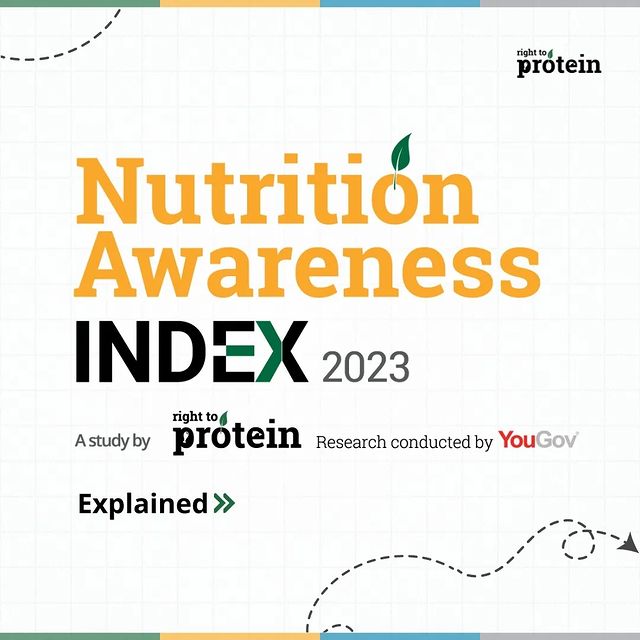Be it a patient or a health professional, the role of the nutritionist is often overlooked as a valuable resource in primary care. With the rise of chronic disease and lifestyle-related health issues, nutritionists are now more than ever needed as a front-line defense with services that that extend far beyond dietary advice. Nutrition services can play an essential role in the prevention and management of several conditions seen by family physicians, but access to these services in primary care is limited. As a patient, or healthcare provider, reading this will give you a new perspective on the importance of nutritionists in primary healthcare.
Statewide Research Finds India Needs to Understand a Balanced Diet.

According to the Nutrition Awareness Index 2023, India needs to understand a balanced diet, with a shocking 83% unaware of vegetarian sources of Protein. The Index is a research conducted by YouGov, an internet-based market research and data analytics firm for the “Right to Protein” campaign, an awareness initiative to educate people about the importance of adequate protein consumption for better nutrition, health, and wellbeing. The study involved 20 states with the highest GDP and is an extensive assessment of nutrition awareness, affordability, and accessibility of nutrition in India. Some examples of the findings among the participants were:
- 53% of young Indians aged between 18 and 35 find nutrition access difficult.
- 50% said they consumed a balanced diet but had no idea of nutritional food sources
- 70% of Uttarakhand recognized fats as part of a balanced diet
- Only 29% of participants in Andhra Pradesh recognized the importance of pulses and legumes as body-building foods
- 85% OF INDIANS WERE UNAWARE OF VEGETARIAN SOURCES OF PROTEIN
- 50% did not know what healthy fats are
- Punjab was the top state when it came to nutrition awareness, with 11% above the national average; Karnataka followed a close second with 9% higher than NA, while Rajasthan and Bihar ranked the lowest at 9% and 10%, respectively.
- The National Family Health Survey (NFHS)-5 2021 has found a 30% increase in malnutrition in India.
NUTRITION AWARENESS INDEX 2023 PDF
The survey not only found that India is protein deficient but also concluded that a good percentage of the population needed to be made aware of protective foods like eggs, vegetables, and fruits. The study was undertaken to educate people about healthy nutrition and build awareness of healthy sources of Protein.
What is interesting to note is how the YouGov survey conducted among educated people found that 85% or 8 in 10 people needed clarification on sources of protein in India. While there was a reasonable awareness of milk, eggs, and meat as protein sources, very few knew about vegetarian sources of Protein. This means India needs to be educated on the abundance of vegetarian sources of Protein that many don’t even know exist. Protein sources from legumes like peas, lentils like moong dal and chickpeas, or knowledge about food like Quinoa and Foxnuts are significantly lacking.
Recommended Dietary Intake of Protein for India
According to the National Institute of Nutrition (India), a balanced diet should consist of carbohydrates, proteins, fats, vitamins, and minerals in appropriate proportions, with 50-60% of total calories from carbohydrates ( preferably complex carbohydrates), about 10-15% from proteins and 20-30% from both visible and invisible fat.
According to the latest dietary guidelines set by the ICMR ( Indian Council of Medical Research), the recommended protein intake for an average Indian man is 54 g/d or 0.8gm to 1gm per kilogram of body weight and for an average Indian woman is 46 g/d, while for children, the recommended daily protein intake is equal for boys and girls up to 9 years of age. While global protein intake is increasing, India still has the lowest average protein consumption (at 47gm per person per day).
This brings us back to the basis of this article on the importance of nutritionists in primary care. Making nutritionists part of the healthcare plan ensures everyone, both healthy and the ill, gets a genuinely balanced diet consisting of affordable and healthy sources of Protein. Here are some more reasons why nutritionists play a significant role in primary and preventive care.
Prevention is Better Than Cure
Preventive care is the initial aim of primary care, and it is in this arena that nutritionists can educate individuals on the importance of a balanced and nutritious diet. Many chronic conditions, such as heart disease, diabetes, and obesity, are closely linked to lifestyle choices, particularly dietary habits. By proactively addressing these factors, nutritionists contribute to preventing the onset of these diseases.
Customized Approaches to Individual Health
Every individual is unique, and their nutritional needs vary based on factors such as age, gender, genetics, and lifestyle. Nutritionists specialize in tailoring dietary recommendations to meet the specific needs of each person. Unlike generic advice found on the internet, personalized nutrition plans consider an individual’s medical history, preferences, and cultural considerations. This customized approach enhances the effectiveness of dietary interventions and ensures that individuals can realistically integrate them into their daily lives.
Management of Chronic Diseases
For individuals already grappling with chronic conditions, proper nutrition can significantly impact disease management and overall well-being. Nutritionists collaborate with other healthcare professionals to develop comprehensive care plans for conditions like diabetes, hypertension, and gastrointestinal disorders. By addressing dietary factors, they contribute to better blood sugar control, blood pressure management, and improved digestion, which are critical components of chronic disease management.
Moreover, nutritionists aren’t just people who plan your diet chart. Today’s nutritionist goes beyond that by informing a patient of foods to avoid or foods to eat in relation to a particular condition or disease. For example, patients with hypothyroidism often turn to the internet to review foods that prevent or are suitable for the state, but the controversial results are utterly confusing. Only a nutritionist with experience in their work covering several patients will possess valuable insight into what’s good and what’s not.
Weight Management and Obesity Prevention
Obesity has reached epidemic proportions globally, posing a significant threat to public health. Nutritionists are at the forefront of the battle against obesity, guiding weight management and healthy lifestyle choices. Their expertise extends beyond mere calorie counting, encompassing behavior modification, stress management, and sustainable lifestyle changes. In primary healthcare settings, nutritionists empower individuals with the knowledge and tools needed to achieve and maintain a healthy weight, thereby reducing the risk of obesity-related complications.
Nutrition and Mental Health
According to one study in the research in the Frontiers, Nutrition 2022, there is a definite connection between nutrition and mental health. The gut microbiome consists of a complex ecosystem of 1,014 microorganisms containing 3.3 million genes outnumbering the human genome. It is also built by thousands of different species of microorganisms, all part of a definite connection between the gut and the brain. This gut-brain axis describes a relationship between the heart and the central nervous system, where there is constant communication between the two via the autonomic nervous system and the vagus nerve. This is also how probiotics can impact our mental status through this information exchange via the vagus nerve.
While the role of nutrition in mental health was not a very appreciated subject pre-21st century, today is a different story. Emerging research is now finding how food affects mental health, which is why a nutritionist becomes an integral part of the rehabilitation process of people suffering from stress and mental health disorders.
Nutritionists can collaborate with mental health professionals to incorporate dietary interventions into the overall treatment plan. By addressing nutritional deficiencies and promoting brain-boosting nutrients, they contribute to a holistic approach to mental health care.
Promoting Healthy Aging
As populations age, the importance of nutrition in promoting healthy aging becomes paramount. Nutritionists work with older adults to address age-related nutritional challenges, such as decreased appetite, nutrient absorption issues, and changes in dietary requirements. Their expertise is invaluable in preventing malnutrition, maintaining muscle mass, and supporting bone health, all of which are critical for a vibrant and healthy life in the later years.
Educating Communities for Long-Term Impact
Nutritionists don’t just work with individuals; they also play a crucial role in community education. Through workshops, seminars, and outreach programs, they disseminate evidence-based information on nutrition, debunk myths, and provide practical guidance. By fostering a culture of health at the community level, nutritionists in primary healthcarecare contribute to long-term behavior change, creating healthier societies from the ground up.
Nutritionists in Primary Care are Valuable Assets
Investing in nutritionist services as part of primary healthcare can be a cost-effective strategy in the long run. By preventing and managing chronic conditions, nutritionists contribute to reducing the economic burden associated with these diseases. The cost of nutritional counseling and education is often significantly lower than the expenses incurred in treating advanced stages of chronic illnesses.
This is where emerging healthcare providers like Ensocure Integrated Medicine in Bengaluru have understood how the collaboration between nutritionists, doctors, and psychotherapists can create a robust ecosystem of preventive and primary care. At Ensocure, nutritionists work closely with physicians, nurses, and other healthcare professionals to ensure that dietary interventions are seamlessly integrated into overall treatment plans, optimizing outcomes for patients.

Nutritionists are influential in healthcare as they are an essential step towards building a healthier and more resilient society. From preventive measures to managing chronic conditions, addressing mental health, and promoting healthy aging, nutritionists play a pivotal role in the holistic well-being of individuals and communities. Integrating nutritionists in primary healthcare is an investment in the complex landscape of modern healthcare, paving the way to optimal health for all.

